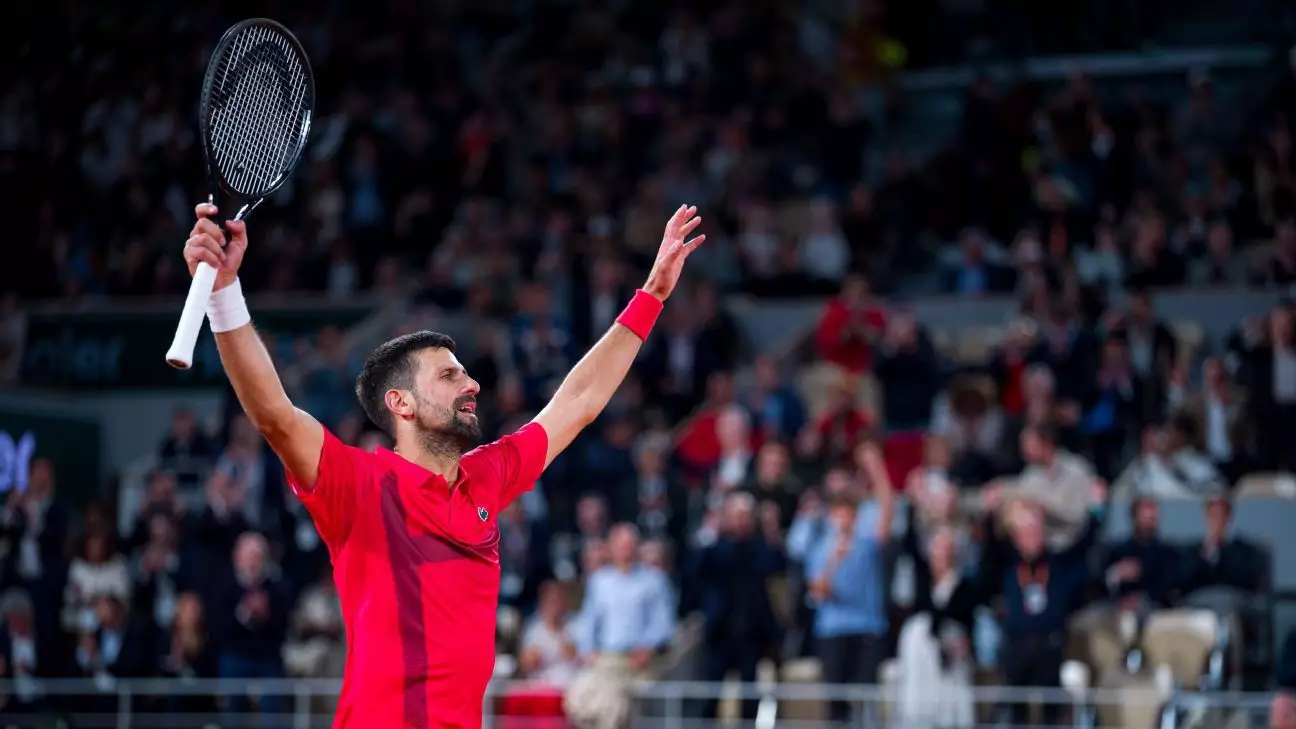In an astonishing display of athletic prowess and strategic brilliance, Novak Djokovic has once again captured the spotlight as he embarks on his journey through the 2023 French Open. Fresh off securing his 100th professional title, skepticism surrounded his chances of clinching yet another Grand Slam at the age of 38. Yet, his recent performance against Alexander Zverev in the quarterfinals has silenced many doubters, highlighting the Serbian’s indomitable spirit and mastery of the game. Djokovic’s resilience was on full display as he moved past Zverev with a scoreline of 4-6, 6-3, 6-2, 6-4, marking his 51st Grand Slam semifinal appearance.
The victory served as a triumphant reclamation of form, especially given the lingering memory of his earlier withdrawal from their previous meeting at the Australian Open due to injury. Djokovic’s latest triumph not only reinstated his position in the championship conversation but demonstrates that age does not hinder excellence; rather, it can enhance the sagacity of a seasoned athlete.
Strategic Mastery and Adaptation
From the outset of the match, the set-up was ripe for a classic showdown. However, Djokovic struggled initially, dropping his opening service game. What followed was a testament to his incredible adaptability. After changing rackets—an act that seemed to reset his focus—he displayed a remarkable turnaround. With only 52% of his first serves landing in the court at the beginning, many fans held their breath as Zverev maintained an early break advantage.
It wasn’t until the second set that Djokovic found his rhythm, showcasing his remarkable serving abilities. Tactics played a significant role in this transition; he began to serve wide and utilized the serve-and-volley strategy, effectively cutting off Zverev’s return time. The result was a staggering increase in his first serve percentage, climbing to 76% and later peaking at 78%.
Conversely, Zverev’s struggle, particularly on second serves, laid the groundwork for Djokovic’s resurgence. Winning only 33% of second serves in the second set and a dismal 20% in the third illustrated the pressure Djokovic was putting on him. Moreover, Djokovic’s risk of utilizing drop shots—35 during the match—proved both daring and effective, becoming a vital part of his game strategy.
Psychological Warfare and Physical Endurance
What often separates champions from mere contenders in high-stakes matches like these is psychological strength. Djokovic’s success against Zverev was not merely rooted in technical skill, but also in his ability to read the match, anticipate the opponent’s moves, and dictate the terms of engagement. As Zverev attempted to rally in the fourth set with fleeting moments of brilliance, Djokovic remained impervious, sustaining focus and maintaining his level.
Djokovic’s tactical variations equal parts surprised and unsettled Zverev, who might have preferred a more conventional, baseline exchange. Instead, from the end of the first set onwards, Djokovic made the court feel smaller, forcing Zverev into a reactive position. The 41-shot rally Djokovic won while saving a break point exemplifies both players’ endurance, but also underscores Djokovic’s tactical savvy; he thrives in lengthy, drawn-out exchanges where his experience and fitness shine through.
A Daunting Path Ahead
As Djokovic gears up for his semifinal match against world No. 1 Jannik Sinner, the landscape ahead is fraught with challenges. Sinner’s recent victories over Djokovic add a layer of complexity to the narrative. Djokovic understands that the road to the championship will only grow more treacherous—should he manage to defeat Sinner, a potential final against Carlos Alcaraz awaits.
No player has ever vanquished the world’s top three players back-to-back to secure a Grand Slam title, making this pursuit not only a physical battle but also a monumental historical challenge. Djokovic himself has often thrived on the notion of being an underdog—set against overwhelming odds, he finds renewed motivation. That drive may be compounded by the knowledge that he has overcome everything from age-related skepticism to fierce competition, all while maintaining the ethos that champions are made in the crucible of adversity.
The upcoming matches will test not only his physical capabilities but also his mental fortitude, further solidifying Novak Djokovic’s status as one of the greatest players in the annals of tennis history.


Leave a Reply